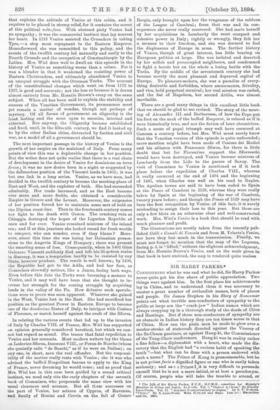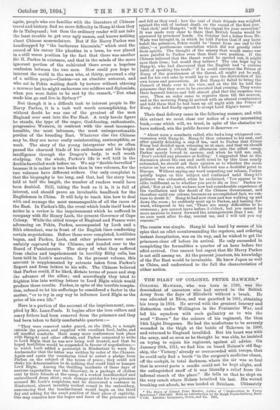SIR HARRY PARKES.*
CONSIDERING what he was and what he did, Sir Harry Parkes never quite got his due share of public appreciation. Two things were against him. In the first place his achievements lay in China, and to understand them it was necessary to- , master a great number of outlandish names, both of places and people. Sir James Stephen in his Story of Nuncomar points out what terrible non-conductors of sympathy to the public at large are the " crack-jaw " Indian names which are always cropping up in a thorough study of the deeds of Clive and Hastings. But if these non-conductors of sympathy are an obstacle in Indian history they are ten times worse in that of China. How can the plain man be made to glow over a, master-stroke of statecraft directed against the Viceroy of the Se-Chuen province, or against Hang-ki, the Commissioner of the Tung.Chow conferences. Hang-ki was in reality rather a fine fellow—a diplomatist with a heart, who made the dis- covery that the English had "a curious habit of speaking the truth "—but what can be done with a person endowed with such a name P The Prince of Kung is pronounceable, but he is not prima facie a dignified figure or one who is easily taken seriously ; and as f■ r Prince I, it is very difficult to persuade oneself that he is not a mere initial, or at best a pseudonym. Of course, people who will take the trouble to attend, or • The Life nt Sir Harry Parkes, K C.B, G.C.M.G , sometime her Majesty's ' Minister in Oqina and Japan. In 2 vols. Vol. I. "Gonna n China." By Stanley Lane-Poole. Vol. II. " tainister Plenipotentiary to Japan." By P. V. D okens. " Mina." By 9, Lane-Poole. With Pcrti ait and Maps. Lon ton Macmillan.
and Co. 1991. again, people who are familiar with the literature of Chinese travel and history, find no more difficulty in Han g-ki than they do in Talleyrand ; but then the ordinary reader will not take the least trouble to get over ugly names, and knows nothing about Chinese nomenclature. But if Sir Harry Parkes was handicapped by "the barbarous binomials," which stud the record of his career like plantins in a lawn, he was placed in a still worse position by the fact that there was another Sir H. Parkes in existence, and that in the minds of the more ignorant portion of the cultivated there arose a hopeless confusion between the two men. How could you hope to interest the world in the man who, at thirty, governed a city of a million people—Canton—as an absolute autocrat, and who sat in Pekin waiting death by torture without uttering a murmur lest he might embarrass our soldiers and diplomists, when you were liable to be met by the remark, "But what made him go and live in Sydney?"
But though it is a difficult task to interest people in Sir Harry Parkes, it is a task well worth accomplishing, for without doubt he was one of the greatest of the men England ever sent into the Far East. A truly heroic figure he stands, the type of the eager, God-fearing, enthusiastic, progressive Western, in contrast with the most incompre- hensible, the most inhuman, the most unimpressionable portion of the brooding East. Whatever else the Chinese may be, they are never really uninteresting, contemptible, or weak. The story of the young interpreter who so often passed the charmed blade of his enthusiasm and his bright intelligence through the Dragon's body, is well worth studying. On the whole, Parkes's life is well told in the double-barrelled work before us. We say " double-barrelled " because it is rather in two books than in two volumes, for the two volumes have different writers. Our only complaint is that the biography is too long, and that, had the story been told at half the length, the number of readers would have been doubled. Still, taking the book as it is, it is full of interest, and should prove an invaluable handbook for the Englishman in China. It will help to teach him how to deal with and manage the most unmanageable of all the races of the East. In Parkes's life, the event which lends itself best to notice in a review is the imprisonment which he suffered in company with Sir Henry Loch, the present Governor of Cape Colony. While the allied troops of England and France were advancing on Pekin, Parkes, accompanied by Loch and a Sikh attendant, was in front of the English lines conducting certain negotiations. Before these were completed, hostilities began, and Parkes, Loch, and other prisoners were most unfairly captured by the Chinese, and banded over to the Board of Punishments. The story of what they suffered from chains and imprisonment in horribly filthy cells, has been told in Loch's narrative. In the present volume, this account is supplemented by extracts taken from Parkes's Report and from letters to his wife. The Chinese believed that Parkes could, if he liked, dictate terms of peace and stop the advance of the allies ; and accordingly they tried to frighten him into writing letters to Lord Elgin which would produce these results. Parkes, in spite of the terrible tempta- tion, refused to let his sufferings be considered a factor in the matter, "or to try in any way to influence Lord Elgin as the price of his own life."
Here is a portion of the account of the imprisonment, com- piled by Mr. Lane-Poole. It begins after the iron collars and neavy fetters had been removed from the prisoners and they had been taken to fairly comfortable quarters :—
" They were removed under guard, on the 29th, to a temple outside the prison, and supplied with excellent food, baths, and all needful comforts. Here many more conferences took place with Hang-ki and other officials, and Parkes consented to write to Lord Elgin that he was now being well treated, and that he hoped hostilities would be suspended in favour of negotiations,— to which Loch added a postscript in Hindustani to warn the Ambassador that the letter was written by order of the Chinese. Again and again the mandarins tried to extort a pledge from Parkes on the subject of the terms of peace ; they could not shake his determination to do nothing that could bind or hamper Lord Elgin. Among the thrilling incidents of these days of anxious expectation was the discovery, in a package of clothes sent by their friends at the camp, of a worked handkerchief and embroidered dress shirt ; such strange articles for two prisoners aroused Mr. Loch's suspicions, and he discovered a sentence in Hindustani, almost invisibly worked round in the embroidery, announcing that the bombardment would begin on the third day and asking for the exact position of their place of captivity. One may conceive how the hopes and fears of the prisoners rose
and fell as they read : how the zeal of their friends was weighed. against the risk of instant death on the sound of the first gun: that shot, said Hang-ki, will be the signal for your execution.' It was made very clear to them that British bombs would be answered by prisoners' heads. On October 3rd a letter from Mr, Wade was brought in, in which he told Parkes that if any harm befell the prisoners, Pekin would be burnt from one end to the other,'—a posthumous consolation which did not greatly raise their spirits. The thought of the misery that would ensue was more painful to Parkes even than their own position. If the Chinese believed that the threat would be carried out, it might save their lives ; but would they believe ? The one hope lay in Hang-ki, who had discovered that the English had a curious habit of speaking the truth :' if he could convince the Prince of Kung of the genuineness of the threat, all might yet be well, and for his own sake he would try to save the destruction of his own house and possessions. At first Hang-ki failed to bring the Council of State over to his view, and on the 5th he told the prisoners that they were to be executed that evening. They wrote their farewell letters and felt almost glad that the suspense was over. Then an order came to reprieve them till the morrow, and in the morning Hang-ki arrived with an altered countenance and told them that he had been up all night with the Prince of Kung, who had finally agreed to accept Lord Elgin's terms."
Their final delivery came in the following manner, and with this extract we must close our notice of a very interesting book,—one which will, we trust, in spite of the obstacles we have noticed, win the public favour it deserves :—
"About noon a mandarin called, who hada long whispered con- versation with Hang-ki. Hang-ki then returned to his seat, and. after quietly drinking a cup of tea, said to Parkes that Prince Kung had decided upon releasing us at once, and that we should be sent about 2 o'clock that afternoon into the allied camp. Parkes merely bowed in answer, and when he told me, said, Don't exhibit any pleasure or feeling.' I suggested that as the discussion about the sun and earth must be by this time nearly exhausted, he should ask their opinion as to whether the moon rotates on her own axis, which I believed was a doubtful point in Europe. Without saying one word respecting our release, Parkes quietly began on this subject and continued until Hang-ki's patience was exhausted, when he exclaimed, You appear to be alike indifferent as to whether you are to die or live.' Parkes re- plied,' Not at all ; but we have now had considerable experience of the vacillation and the deceit of the Chinese Government, and therefore until our release becomes an accomplished fact, we ven- ture to doubt it.' Hang-ki had now risen and was walking up and down the room ; he suddenly went up to Parkes, and leaning for- ward, whispered in his oar, There are many difficulties to be overcome ; you cannot leave before 2 o'clock, but you cannot be more anxious to hurry forward the arrangements than I am. If we over meet after to-day, remind me, and I will tell you my reasons."
The reason was simple. Hang-hi had heard by means of his spies that an edict countermanding the reprieve, and ordering instant decapitation, was on its way, and he wished to get the prisoners clear off before its arrival. He only succeeded in completing the formalities a quarter of an hour before the edict arrived. One cannot but regret that Sir Harry Parkes is not still among us. At the present juncture, his knowledge of the Far East would be invaluable. He knew Japan as well as China, and understood to the full the characteristics of either nation.





































 Previous page
Previous page